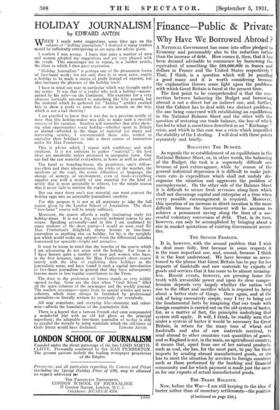THE SECOND PROBLEM.
It is, however, with the second problem that I wish to deal more fully, first because in some respects it is the more important one, and, second, because I think it is the least understood. We have become so accus- tomed to the phrase that Great Britain has to pay for her imports of foodstuffs and raw materials by exports of goods and services that it has come to be almost meaning- less. Recent events, however, are pressing home the truth with irresistible power and upon its clear compre- hension depends very largely whether the nation will rise to the effort and sacrifice which is required to bring about a better state of things. Once again, and at the risk of being excessively simple, may I try to bring out the fundamental facts by imagining that our trade with foreign countries is carried out on the old system of barter, for, as a matter of fact, the principles underlying that system still apply. It will, I think, be readily seen that under a system of barter it would be necessary for Great Britain, in return for the many tons of wheat and foodstuffs and also of raw materials received, to send abroad to other countries vast quantities of goods, and as England is not, in the main, an agricultural country, it means that, apart from one of her natural products, such as coal, she has, for the most part, to pay for these imports by sending abroad manufactured goods, or she has to meet the situation by services to foreign countries such as those performed by the banking and financial community and for which payment is made just the same as for our exports of actual manufactured goods.






























 Previous page
Previous page